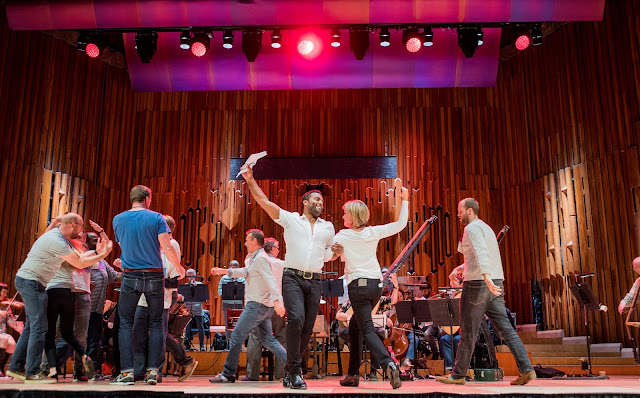 |
| Purcell: King Arthur - Louise Alder, Ray Fearon, Mhairi Lawson - Academy of Ancient Music (photo Robert Workman) |
Reviewed by Robert Hugill on Oct 3 2017 Star rating:
An engaging and thought provoking re-working of Purcell's problem semi-opera
What to do with Purcell and Dryden's King Arthur? The full version involves a team of actors and a team of singers and instrumentalists, not to mention the fact that the spoken text is hardly John Dryden's greatest work. Shorn of spoken text, the music falls in danger of presenting a beautiful but too polite series of lovely fragments. The solution offered by the Academy of Ancient Music and director Daisy Evans (with dramaturg Thomas Larners and lighting director Jake Wiltshire) at the Barbican Hall on Tuesday 3 October 2017 was radical yet engaging.
 |
| Ivan Ludlow & chorus - Academy of Ancient Music (photo Robert Workman) |
The staging, billed as a semi-staging, had a Brechtian directness. Singers and instrumentalists in casual clothes, a pair of boards to announce the location and subject of each scene, and all the singers (soloists and choir) combining into one ensemble which explored themes of identity and the way people tend to identify themselves into tribes. The starting point, of course, was Brexit and we began with Ali Smith's poem 'All across the country' (from Autumn) which gave us a striking starting point after the engaging account of the overture drew us in.
Evans had explained that when she had first looked at King Arthur it had shouted Brexit at her, as the original piece examined ideas of British identity, with wars against foreigners and a triumphant British mask at the end. What was remarkable, was how well the music fitted our modern situations. Evans gave us a series of contemporary scenes with people dividing up and identifying themselves and it was fascinating how the rumbustious of 'Saint George' and 'Harvest Home' fitted a group of men in the pub, whilst 'Woden, first to thee ' became an election hustings. No violence was done to the music or the sung text, it was presented exactly as it has come down to us (the work's survival is partial and not all the music we have may be by Purcell), yet Evans created something very thoughtful. Some scenes were ingenious, the battle music was used for a scene of fighting commuters, and we had scenes of love in a night-club. Because the production used no sets, just a couple of display boards, we had to do a lot of the work ourselves, and this applied to the way the music and spoken text functioned. The result was multi-levelled and startlingly non didactic for such a dialectically organised piece. Daring and original.
 |
| Purcell: King Arthur - Academy of Ancient Music (photo Robert Workman) |
The principal feature of the evening was the sheer engaging quality of the performance, with soloists part of a greater ensemble of individuals who addressed us and engaged with us in dialectical discussion. Louise Alder got the plum and gave us a bleak yet poignant account of 'Fairest Isle', whilst she and Mhairi Lawson combined to make to very seductive sirens indeed. Ashley Riches was a memorable Cold Genius (here the cold people were denizens of a homeless shelter) with Mhairi Lawson a characterful Cupid. Reginald Mobley's sweet toned counter-tenor, Charles Daniels' characterfully incisive tenor, and Ivan Ludlow's flexible baritone all provided strong contributions, as the singers popped up in a variety of roles.
Ray Fearon was terrific in his role as narrator, bewildered participant and onlooker. Commanding in his Shakespeare speeches which included excerpts from Henry V, and poignant in others such as TS Eliot's We are the hollow men. The selection of text was admirably wide, Ali Smith, Robinson Jeffers, Shelley, Blake, Rose Macauley, TS Eliot, Shakespeare, Wislawa Szymborska, Charles Bukowski, and Arthur Kramer.
 |
| Purcell: King Arthur - Academy of Ancient Music (photo Robert Workman) |
Elsewhere on this blog:
- Middle of the road but far from boring: Mozart's Requiem from Winchester Collge - CD review
- Terrific performance: Damian Thantrey in Thomas Hyde's That Man Stephen Ward - CD review
- Double helping: chamber music by Michael Haydn, RVW, Alec Roth, Haydn, Thomas Ades, and Schubert in a pair of concerts from the Hatfield House Chamber Music Festival - concert review
- We all say yé-yé: The Chanteuse talks about recreating the songs of Nobel Prize-winning author Patrick Modiano - interview
- Strong singing & stage spectacle: Verdi's Aida at English National Opera - Opera review
- Britten & Silvestrov: Jan Vogler, London Philharmonic & Vladimir Jurowski - concert review
- Architecture into music: Tamsin Waley-Cohen in Freya Waley-Cohen's Permutations - CD review
- Daring: Fieri Consort in Monteverdi and Ben Rowarth - CD review
- Of electro-acoustic music, trombones and cheese: I chat to composer Jack White about his new piece for trombonist Peter Moore - interview
- Failture to ignite: Rossini early comedy at Teatro la Fenice in Venice - opera review
- The Grange Internaitonal Singing Competition - concert review
- Orchestra to the fore: Enescu's Oedipe from Vladimir Jurowski and the London Philharmonic Orchestra - opera review
- Home

.jpg)









No comments:
Post a Comment